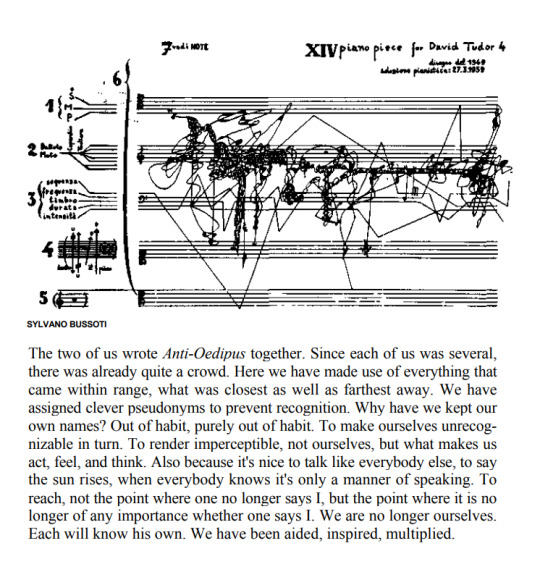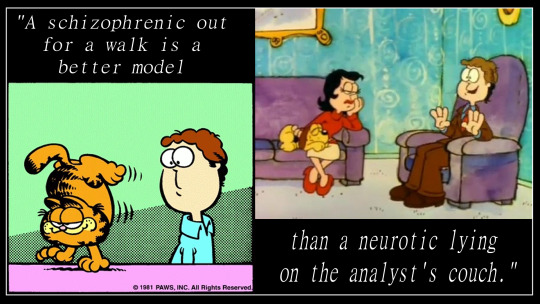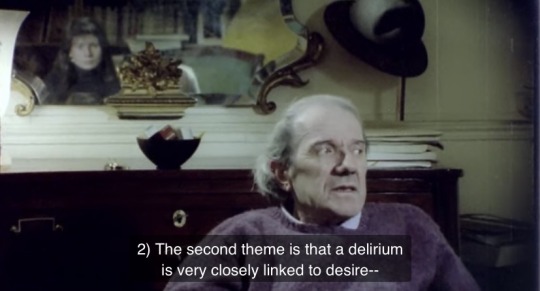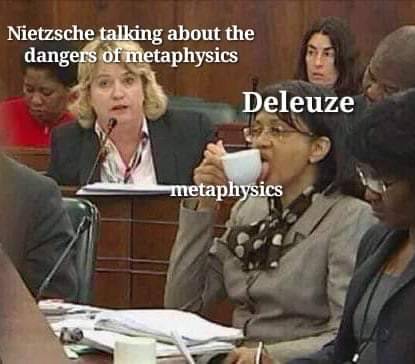#deleuze
Text
There is, then, a philosophy of "life" in Spinoza; it consists precisely in denouncing all that separates us from life, all these transcendent values that are turned against life, these values that are tied to the conditions and illusions of consciousness. Life is poisoned by the categories of Good and Evil, of blame and merit, of sin and redemption. What poisons life is hatred, including the hatred that is turned back against oneself in the form of guilt.
Gilles Deleuze, Spinoza: Practical Philosophy (1970)
221 notes
·
View notes
Quote
We're riddled with pointless talk, insane quantities of words and images. Stupidity's never blind or mute. So it's not a problem of getting people to express themselves but of providing little gaps of solitude and silence in which they might eventually find something to say. Repressive forces don't stop people expressing themselves but rather force them to express themselves. What a relief to have nothing to say, the right to say nothing, because only then is there a chance of framing the rare, and ever rarer, thing that might be worth saying.
Gilles Deleuze, Negotiations, 1972-1990
948 notes
·
View notes
Note
i saw ur response to the unconscious/conscious as supposedly “divided spectrums” and it got me rotating ol homoerotic duo deleuze-guattari's great anti-oedipus (and mil platôs too, for one). i tried searching up if u had written on it but couldn't find anything at all – wld love to hear some thoughts. any of your thoughts about it akshually. peace
hah anti-oedipus was my first foray into psych-critical scholarship way back in the day :')
my position on psychoanalysis has evolved a lot since then and i think most noticeably in the sense that i've become a lot more interested in historicising it and less interested in haggling over its scientificity or whatever---ie, the question to me isn't so much "is mommy-daddy-me an intrinsically organising principle of human psychology" (obviously not) but more "what are the conditions that allow the claim to be credibly made that it is?" which is i guess to say that, like, in some ways the less insightful part of a text like anti-oedipus is always going to be the assertion that the current ruling ontology isn't a transcendentally necessary one---like, of course it isn't, lol, and the analysis here would be so productively served if deleuze and guattari had a serious engagement with historical thinking; deleuze at his best is on par with like foucault as far as historicity goes.
i think the model that anti-oedipus proffers of a broadly schizophrenic operating logic of capital has some explanatory utility but i don't think that's equivalent to forming a foundation for liberatory political action. i find deleuze generally at his most interesting where he takes up the claim that the desire for one's own oppression is not just a matter of a kind of socratic lack of (self-)knowledge and is instead a genuine expression of desire under capitalism and its familialism. but for as much as this part of the argument wants to build off reich, it's also a place where the text is noticeably not building off a historical-material analysis and instead has a really unhelpful unproductive tendency to tell a psychological myth of desire as an intrinsically revolutionary force and capitalism as motivated by the need to constrain it. so again this is, at best, just not a foundation for liberatory action because it's not historically or materially grounded.
i really adored deleuze and guattari when i first read them and i would still say that anti-oedipus and a thousand plateaus changed a lot about how i thought and read. but also these days i would honestly throw in for reich or like any other frankfurt freudo-marxist over most deleuze, lol
51 notes
·
View notes
Text

"A Thousand Plateaus" (1980), Gilles Deleuze & Felix Guattari
407 notes
·
View notes
Text
"… the major enemy, the strategic adversary is fascism. And not only historical fascism, the fascism of Hitler and Mussolini—which was able to mobilize and use the desire of the masses so effectively—but also the fascism in us all, in our heads and in our everyday behaviour, the fascism that causes us to love power, to desire the very thing that dominates and exploits us."
Michel Foucault, Preface to “Anti-Oedipus: Capitalism and Schizophrenia”, by Gilles Deleuze & Felix Guattari
128 notes
·
View notes
Text
Deleuze on dreams
Even the most gracious of young girls is a terrible devourer—not because of her soul but because of her dreams.
#the phrase actually translates to ‘if you’re trapped in the other’s dream you’re fucked’#philosophy#deleuze#gilles deleuze#dreams#dream#reves#reve#fav#hide
436 notes
·
View notes
Text

Deleuze & Guattari
68 notes
·
View notes
Text
"That is why the fundamental problem of political philosophy is still precisely the one that Spinoza saw so clearly, and that Wilhelm Reich rediscovered: "Why do men fight for their servitude as stubbornly as though it were their salvation?" How can people possibly reach the point of shouting: "More taxes! Less bread!"? As Reich remarks, the astonishing thing is not that some people steal or that others occasionally go out on strike, but rather that all those who are starving do not steal as a regular practice, and all those who are exploited are not continually out on strike: after centuries of exploitation, why do people still tolerate being humiliated and enslaved, to such a point, indeed, that they actually want humiliation and slavery not only for others but for themselves? Reich is at his profoundest as a thinker when he refuses to accept ignorance or illusion on the part of the masses as an explanation of fascism, and demands an explanation that will take their desires into account, an explanation formulated in terms of desire: no, the masses were not innocent dupes; at a certain point, under a certain set of conditions, they wanted fascism, and it is this perversion of the desire of the masses that needs to be accounted for."
Gilles Deleuze and Felix Guattari, Anti Oedipus: Capitalism and Schizophrenia (Page 29)
73 notes
·
View notes
Text
It is reactive forces that express themselves in opposition, the will to nothingness that expresses itself in the labour of the negative. The dialectic is the natural ideology of ressentiment and bad conscience. It is thought in the perspective of nihilism and from the standpoint of reactive forces. It is a fundamentally Christian way of thinking, from one end to the other; powerless to create new ways of thinking and feeling. The death of God is a grand, noisy, dialectical
event; but an event which happens in the din of reactive forces and the fumes of nihilism.
--Gilles Deleuze, Nietzsche and Philosophy, pg. 159
#deleuze#nietzsche#nihilism#dialectics#ressentiment#bad conscience#reaction#reactive#reactionary#christianity#why all marxists are reactionary#socialism as the secular form of christianity
62 notes
·
View notes
Text

continuing my streak of being a total unreasonable cunt about Deleuze, this is a lot of unnecessary words to say "charisma"
#a poetic description of charisma's effect is a fine thing! i don't think this one adds anything or brings me any pleasure!#i really don't know what it is about gilles but truly 99.8% of the time i'm just like#''why are you working so hard to say something so obvious''#a lot of those times it's obvious because hes restating foucault with even more obscurantism so this all tracks really#the best and the brightest can bite me#deleuze
87 notes
·
View notes
Text

#deleuze#guattari#psychoanalysis#schizoanalysis#anti oedipus#deleuze and guattari#garfield#shitpost#capitalism and schizophrenia#philosophy
66 notes
·
View notes
Text
Le paranoïaque machine des masses, et ne cesse de former de grands ensembles, d'inventer des appareils lourds pour l'encadrement et la répression des machines désirantes. Certes, il ne lui est pas difficile de passer pour raisonnable, en invoquant des buts et des intérêts collectifs […]
(Gilles Deleuze, Félix Guattari, L'Anti-Œdipe)
17 notes
·
View notes
Text
Okay so my first post is going to be about the link between capitalism and existential angst, which is the most on brand thing possible for me, so if you like this there’ll be much more of it and if not… sorry. ��
I’ve always had a proclivity for angsty existentialism. Multiple times a housemate has found me sprawled on a sofa moping about the meaning of life which sounds really pretentious but idk I feel like on some level that’s just being a student. And it’s that material side of it that’s got me curious recently like - were these anxieties just a result of the kind of individualistic, listless existence a student inhabits? There’s probably a reason the stereotypes of angst are people with enough wealth to avoid work but not enough respect or expectations to have a solid idea about what they should be doing: Percy Shelley, Lord Byron, Søren Kierkegaard, etc.
In the first volume of his Critique of Everyday Life, Henri Lefebvre calls out Kierkegaard specifically as a prime example of bourgeoise alienation, the result of which was literally creating existentialist philosophy - the idea that we have to create meaning for ourselves by force of will and taking a leap of faith. Lefebvre claims that existential angst is always a result of some sort of alienation. When Marx formulated alienation as the psychological suffering we experience when we are separation from ourselves, each other, the products of our labour, and nature, he was thinking about the way the working class are made to suffer under capitalism, but Lefebvre expands the theory beyond this. He describes how alienation is always relative and present in all types of society for all people within it. Alienation is not just a result of individualism and exploitation - it also presents itself when we feel too far from someone we love, and when we are mystified by the natural world. Crucially, we are alienated when we become detached from the fact that we are dependent on others for our survival, something common to all the bourgeoisie.
Acknowledging this dependency would make us aware of the injustice of how these responsibilities are distributed (according to class, gender, race, etc.), and getting past the separation would require a radical change in lifestyle involving the rejection of the serving of the individual self so integral to bourgeoise morality. It’s hard! But with the lines between proletariat and bourgeoisie becoming more and more blurred with the expansion of the middle class, recognising this particularly bourgeoise suffering is important, I think, if we want to articulate a reason more people can get behind to resist capitalism.
People suffer when they’re separated from people, when their material existence feels so isolated and insignificant that they have to rely on spirituality to give them any sense of grounding, but are unable to be confident in their beliefs so can only ever relate to religion through anxiety (both my best friends speak of religion in this way, and before I read Lefebvre I was tempted to join them because it sounded better than the nihilism I was struggling with). Seriously, read any Kierkegaard and you will know he was not a happy guy. He wrote book called The Concept of Anxiety, and Fear and Trembling for God’s sake. He’s not okay! 🥺 But poor Søren might have been okay if he’d been a bit less self obsessed, acknowledged the value of *inter*subjectivity rather than pure responsibility, and actually married his fianceé rather than worrying about his independent morality, which was really just arrogance. I sound mean but I love him really. He’s very entertaining and *painfully* relatable.
But this is why I find Simone de Beauvoir to be the absolute best of the existentialist canon, because she recognises the need for recognition and connection, even for the powerful. In The Ethics of Ambiguity, she writes about how even tyrants suffer in hierarchical societies because they can never know authentic respect, since people always see their power and the threat implicit in it rather than their whole humanity. This doesn’t mean that we should never violently resist tyranny, because individualism is hard to overcome, even when it’s self-sabotaging, but awareness of this could get more people on the side of equality. This idea is apparently supported empirically in The Spirit Level, by Richard Wilkinson and Kate Pickett, but I haven’t read that one yet. I like to put it in Spinozist terms: the satisfaction of one desire can be excessive when it blinds us to our other needs and presents us from feeling other forms of joy.
On how it can be overcome though, I think Judith Butler offers an interesting frame for thinking about it. Though they’re best known for their work on the social construction of gender, my favourite book of theirs is Giving An Account of Oneself, where they write about how our mental life is a product of all our previous experiences, especially with other people. This seems obvious on some level, but it really undermines individualism. In particular, it deconstructs the distinction between attacking parts of yourself and attacking other people. If our internal and external lives are so interlinked, is it really surprising if attacking ourselves isolates us? Recognising that other people are in some sense present within us is conducive to greater intimacy, and though this can be uncomfortable if we dislike part of them, that doesn’t make it less true, and recognising this can make us more compassionate with everything within us. Self-hatred and hatred of others are intimately connected, and they reinforce each other.
I like to think of the relationship between different parts of myself in terms of Deleuze and Guattari’s machinic unconscious, where our minds are made up of interlocking parts from the larger social context. I think differ though in wanting to negotiate and find equilibrium between them rather than experimenting by letting certain parts go to extremes to make change though. I like the way Jacques Derrida writes about it in The Politics of Friendship, where to recognise the other in oneself, and so recognise the misalignment within ourselves, requires us to be a friend to oneself, which makes friendship so central that it undercuts any potential narcissism because by loving oneself as an other we learn to love others better (as well ourselves).
This doesn’t address the concrete politics of the situation though. The aspect missing is that we have to think of ourselves as inextricably linked to our social and political systems, part of a historical process, and our feelings about those systems are a very real part of that process, and if we want to be true to ourselves we have to act on those feelings rather than repress them. I’m still working out what that means for myself, and as Lefebvre notes it’s this final hurdle that most people fail at, but we can all try.
That kind of went all over the place, but hopefully it’s understandable and valuable, and if not it was helpful for me to articulate all these ideas that have been swirling around in my head for the past year or so. 😅
#existential angst#existentialism#marx#karl marx#henri lefebvre#simone de beauvoir#judith butler#soren kierkegaard#alienation#interdependence#individualism#deleuze and guattari#gilles deleuze#derrida#jacques derrida#deleuze#capitalism#bourgeoisie#communism#anarchism#spinoza#psychoanalysis#politics#social theory#sociology#philosophy
33 notes
·
View notes



